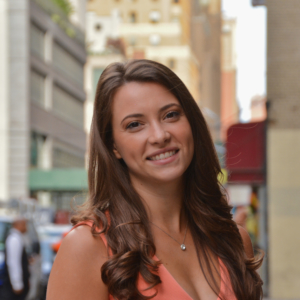
Sami Golaski ’18 took a trip to Google headquarters as a University Innovation Fellow when she was a student at Bucknell’s Freeman College of Management. Courtesy photo
AN IMMERSIVE, EXPERIENTIAL STUDENT EXPERIENCE
Sami Golaski, an accounting and financial management major, graduated from the FCOM in 2018, just a year after it officially became a college. Bucknell in general and FMOC in particular offered everything she was looking for in a university experience: “I felt FCOM was able to offer a dichotomy of opportunities: small class sizes, but strong alumni network; specialized business majors, but a true liberal arts education; AACSB accredited, but extracurriculars that give real life experiences,” she tells P&Q.
She chose her major because she wanted a quantitative background, and she passed the CPA exam on her first attempt – an achievement she attributes to the foundational knowledge she gained at Freeman. She joined the audit group at PwC after graduating, but now works at an outsourced CFO firm providing accounting and finance services to startups.

Sami Golaski
“More importantly, my education at the FCOM actually showed me that I didn’t need to know every fact. The professors and curriculum gave me more important skills on how to approach problems with a business mindset, and communicate with people across an organization,” she says. “Now working with start-ups across industries, I feel confident diving into vague or unfamiliar financial issues.”
Every FMOC freshman is paired with an alumni mentor who will work with them throughout their time at Bucknell. They’re also paired with a Freeman Fellow, a junior or senior that will help with everything from pricking a major and studying for exams to navigating being away from home for the first time. Golaski was one of the very first fellows, and helped create the program as a student.
“FMOC gives students a voice and empowers students to make change on campus. Freeman Fellows is a great example,” Golaski says. “The faculty supported us to shape not just a club, but an actual sustainable curriculum. Every decision the FCOM makes is thinking of how it’s going to affect the student experience, and ultimately a student’s success when they graduate.
“I don’t think you are going to find another business school that cares as much about their students as the FCOM.”
PUNCHING ABOVE ITS WEIGHT
When it comes to punching above its weight, one of the main criteria we look at in our Under the Radar Series, dean Alexander points first to student outcomes.
As a relatively new, small, rural school not located in a coastal urban center, FMOC is placing undergrads in companies that typically recruit from bigger, more storied universities: McKinsey, Goldman Sachs, and PwC.
Part of that can be attributed to its alumni mentor program in which FMOC staff take great pains to match students with alumni who align with their interests. When alumni visit FMOC, they don’t typically visit for an afternoon. Because alumni typically have to travel to Lewisburg, they usually stay for a whole day, sometimes overnight. Alumni take time to have dinner or lunch or coffee with students for deeper, more meaningful connections. “It creates a very specialized and personal experience for students who are creating their own majors and creating their own paths,” she says.
Next, Alexander notes, Bucknell had one of the first undergraduate degrees in sustainable management, beginning about a decade ago before FMOC had evolved into its own college. The university has also been at the forefront of social and community impact, creating a field station in a distressed former coal mining community in which students work to spur economic development.

Raquel Alexander, dean of the Freeman College of Management, poses with Ken Freeman ’72, the college’s namesake. “As a first-generation college student with broad interests, Bucknell provided an excellent education and a solid foundation for pursuing a rewarding career and personal life with a focus on making a difference,” Freeman said upon the forming of the college. “Management education at Bucknell is at an exciting inflection point. By giving in support of the recently established College of Management, we believe we can help accelerate progress and hope to make a meaningful and lasting impact on the lives of students for generations to come.” (Courtesy photo)
Finally, FMOC maintains a hyper focus on creating an individualized student experience. Of the top ranked business programs, it is the only school that caters solely to undergraduates.
“So, every dollar I raise, every faculty member I hire, every new program created is for undergraduates,” Alexander says. “All of our resources go there, and it allows us to do some really special things for every student.”
As it looks to the next five years, FMOC’s commitment to creating a broad, experiential, interdisciplinary student experience will continue to set it apart.
“It’s difficult, if not impossible to understand your opportunities without seeing them. The more crossover you can see, the more possibilities you can imagine,” says Golaski, who as part of her experience, spent a semester in Brussels as well as a month in Chile for a course through the College of Engineering.
“I spent a lot of time in the College of Engineering, and not only required some planning with my FCOM advisor, but also their support. I was encouraged to pursue my interests, even when it was unconventional or made planning difficult. I wouldn’t have my job today if it weren’t from the experiences I had between the two colleges.”
DON’T MISS: HORN ENTREPRENEURSHIP: GIVING SILICON VALLEY A RUN FOR ITS MONEY AND INSIDE DARLA MOORE’S PIPELINE TO TOP WALL STREET FIRMS












Questions about this article? Email us or leave a comment below.